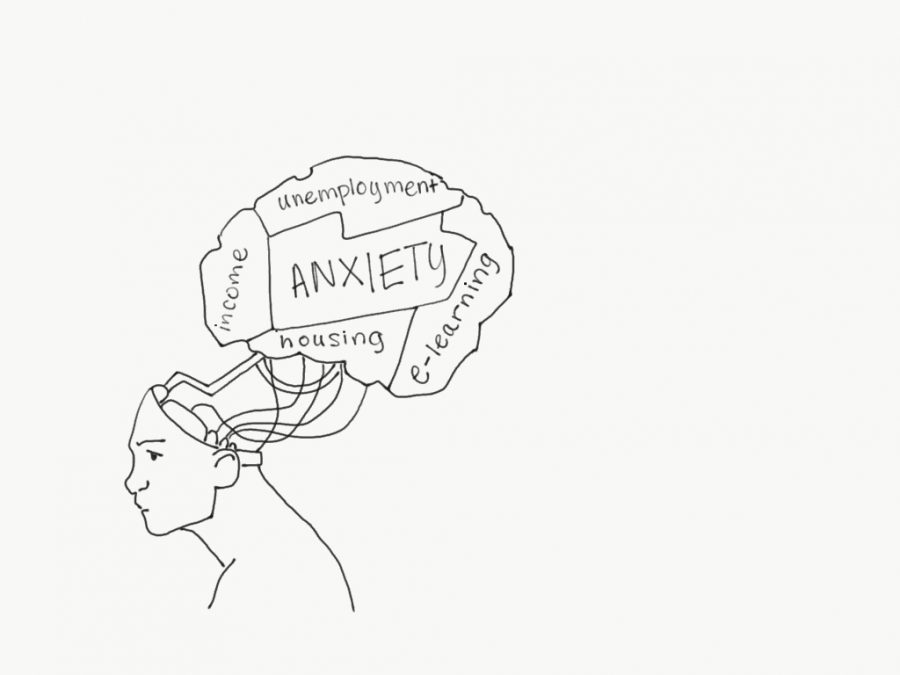Coronavirus quarantine sparks mental health crisis
April 7, 2020
In the last few weeks, the coronavirus pandemic has swept the nation. Restaurants and bars have closed, schools and colleges have shut down and moved to online learning, and the entire State of Illinois is currently on a “shelter-in-place” order, meaning that everyone needs to stay at home unless their reason for leaving is essential. What many people don’t realize is that the coronavirus is not the only life-threatening epidemic we are facing, along with it is an epidemic of mental illness.
The coronavirus is a perfect storm of triggers for anxiety and depression: a literal deadly disease, forced isolation, and lack of control in a world that seems to be falling apart. On top of that, the loss of a job, income, and possibly housing, is a harsh reality for many.
This daunting epidemic is uncharted territory for this country, and it can be anxiety inducing for everyone. People are nervous about their health, the health of their friends and family, having enough food and money, and being away from school and work. Those who struggle with anxiety disorders, including myself, often have intense worry or fear over situations in daily, “normal” life, and this situation is absolutely a nightmare come true. Uncertainty and lack of control of situations can be triggers for those with anxiety, and we are truly living in some of the most uncertain times we have ever seen.
“As a person who thrives on set plans and schedules, not being in school and not knowing how this will all play out is scary for me,” says junior Quinn Sciarra.
Constant media coverage means thinking about these circumstances is unavoidable. The media is constantly talking about the virus, confirmed infections, and virus-related deaths. The never ending flow of information leads to exaggerated fear and anxiety.
“It’s good to keep people informed, but sometimes the news can make this whole thing a bit scary,” explains Sciarra.
Anxiety is not the only mental illness crisis we are dealing with now. Depression can also be easily triggered at this time. Many enjoyable activities, including ones that are used as coping mechanisms for some, are cancelled or strictly forbidden, such as seeing friends or participating in sports and other activities.
Social isolation, as suggested by the CDC and Illinois Department of Health, is a needed step for combatting this pandemic, but it can be harmful for those with depression. According to the American Psychological Association (APA), social isolation can be a trigger of depression. Symptoms of depression can also include further social isolation, resulting in a self-fulfilling cycle. Mandated social isolation can lead to the continuing of this cycle and potentially life-threatening results.
According to NCBI, “Social isolation is one of the main risk factors associated with suicidal outcomes.”
There are specific actions that people with and without mental illness can take to get through this very challenging time. Those who aren’t struggling with mental illness now can check in regularly on their acquaintances, friends and family members. People who have preexisting mental health conditions are likely struggling with the craziness in the world just as everyone else is, but their suffering is often exacerbated by cognitive distortions, irrational patterns of thought that cause us to perceive the world inaccurately. Even those without preexisting conditions are at risk. Our society is changing rapidly, and many people will likely encounter new situations they don’t have the coping skills to deal with.
For those who struggle with mental illness, it’s a very scary time, but there are some things we can do to maintain normalcy and our sense of sanity. Getting into routines, whatever they may be, leaves less space for the mind to wander to the “what ifs”. Whether it be watching Netflix, learning a language, doing schoolwork or talking to a friend, any way of filling the time is valid and helpful. If someone is taking medicine or regularly sees a therapist, they should continue to do that as much as possible. Keeping in touch with friends and loved ones is also a healthy and beneficial step. If possible, move the conversations beyond texting: it’s nice to see someone’s face and hear their voice. If someone needs immediate assistance, it is important to reach out to a mental health resource or hotline. ETHS social workers are available for meetings during regular school hours to have conversations and provide further resources. Teachers, staff, and community members can also be a supportive resource during this time.
The struggles during this time, both from physical and mental illness, must be taken equally seriously, and we must value mental illness on the same level with physical illness. Though it is clearly not contagious, mental illness can be just as debilitating and deadly. Just because someone’s struggles aren’t a global pandemic, it doesn’t mean they don’t need support during this time. We need to support each other and keep each other safe, both by staying home and staying in touch.
Mental Health Hotlines/ Resources:
Contact the SAMHSA Disaster Distress Helpline (800) 985- 5990 that provides 24/7, 365-day-a- year crisis counseling and support to people experiencing emotional distress related to natural or human-caused disasters.
Call the NAMI HelpLine at 800-950-NAMI (6264) Monday through Friday, between 10:00 am and 6:00 pm EST for mental health resources.




















